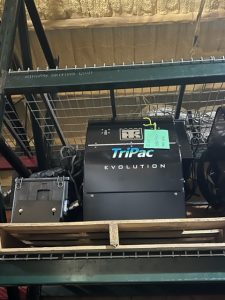Used Apu – Save Money on Your Fleet with a Used APU
For fleet managers, maintaining a balance between operational efficiency and cost management is a perpetual challenge. One often overlooked solution is integrating a used APU (Auxiliary Power Unit) into your fleet. A used APU can offer substantial savings and enhance the performance of your vehicles. Whether you’re new to fleet management or looking to cut down on expenses, understanding how a used APU can benefit your fleet is crucial. In this post, we’ll delve into the fundamentals of APUs, explore the financial advantages of opting for a used APU, and uncover how it contributes to improved fuel efficiency and reduced operational costs.
Understanding the Basics of an APU
An Auxiliary Power Unit (APU) is an essential device for trucks, designed to supply energy for functions unrelated to propulsion, such as powering electrical systems and climate control. Originating from the aviation industry, APUs have become invaluable in trucking by reducing the need for the main engine to idle when the vehicle is stationary. This results in significant fuel savings and less engine wear. The core components of an APU include a small internal combustion engine, a generator, and auxiliary systems like an alternator and air conditioning compressor. This compact setup allows the APU to operate independently of the truck’s main engine, delivering necessary power to various systems without burning excess fuel. One of the primary advantages of using an APU is its ability to maintain driver comfort without requiring the main engine to run. During mandatory rest periods, drivers can rely on the APU to power heating, cooling, and other electrical devices, ensuring a comfortable and restful break. This functionality is crucial for long-haul truck drivers who spend extended periods on the road and need to adhere to strict rest regulations. In addition to enhancing driver comfort, APUs contribute significantly to operational efficiency. By minimizing engine idling, APUs help fleets save on fuel costs and reduce the frequency of engine maintenance. Less idling means reduced engine hours, leading to prolonged engine life and fewer repairs. This translates to lower overall maintenance costs and less downtime for vehicles, keeping the fleet running smoothly and efficiently. The environmental benefits of using an APU cannot be overlooked either. Reduced idling lowers emissions, helping fleet operators meet environmental regulations and potentially qualify for green incentives. This not only aligns with sustainable practices but also promotes a positive corporate image as an environmentally responsible company. Furthermore, investing in an APU, especially a used one, can provide a cost-effective solution for enhancing fleet operations. Used APUs, when well-maintained and properly refurbished, offer reliable performance at a lower upfront cost, making them an attractive option for budget-conscious fleet managers. By incorporating APUs into your fleet, you can achieve a balance of operational efficiency, cost savings, and environmental responsibility.
Upfront Cost Savings with Used APUs
Opting for a used APU can provide immediate and significant financial relief for fleet managers. New APUs come with hefty price tags, making used units an attractive alternative for budget-conscious operations. The pre-owned market offers a wide range of models and prices, giving you the flexibility to find an APU that fits both your needs and financial constraints. Used APUs often undergo extensive refurbishment and testing, ensuring they meet performance standards similar to new units. This rigorous process includes checking the internal combustion engine, generator, and auxiliary systems like the alternator and air conditioning compressor, guaranteeing that the APU functions efficiently. Another advantage is the slower depreciation rate of used APUs compared to new ones. When you purchase a used unit, it retains a greater portion of its value over time, which can be beneficial if you decide to resell or upgrade in the future. This slower depreciation rate also provides more financial stability and flexibility, allowing for better long-term budgeting. Investing in a used APU doesn’t just save on the initial purchase price; it also offers lower insurance premiums. Insurers often base their rates on the value of the equipment, so a used APU typically costs less to insure than a brand-new unit. This reduction in insurance expenses adds another layer of savings to your overall operational costs. Moreover, the availability of parts for used APUs is often more abundant and less expensive, making maintenance more cost-effective. Since these units have been in circulation longer, mechanics are generally more familiar with their repair and upkeep, potentially lowering labor costs. By choosing a well-maintained used APU, fleet managers can achieve substantial upfront cost savings without compromising on reliability or performance.
Fuel Efficiency and Lower Operational Costs
Fuel efficiency is a critical aspect of fleet management, and APUs contribute significantly by reducing engine idling. Studies indicate that an APU can save up to a gallon of fuel per hour, depending on idling habits and vehicle type. These fuel savings accumulate over time, leading to substantial cost reductions. Using a used APU also helps in minimizing the environmental impact of your fleet. Reduced engine idling leads to lower emissions, helping fleets meet stringent environmental regulations. Additionally, the lower emissions can make your fleet eligible for various green incentives and rebates, further enhancing your cost savings. Operational costs are another area where used APUs provide substantial benefits. With the main engine experiencing less wear and tear due to reduced idling, there is a significant decrease in maintenance and repair expenses. This results in fewer breakdowns and less downtime, ensuring that your vehicles remain operational and productive. Moreover, APUs are pivotal in maintaining driver comfort during rest periods by independently powering climate control systems. This not only ensures compliance with mandatory rest regulations but also enhances driver satisfaction and productivity. Happy drivers are less likely to leave, reducing the high costs associated with recruiting and training new employees. In summary, integrating used APUs into your fleet leads to enhanced fuel efficiency and lower operational costs. The accumulated savings in fuel, maintenance, and driver retention contribute to a more cost-effective and efficient fleet operation.

